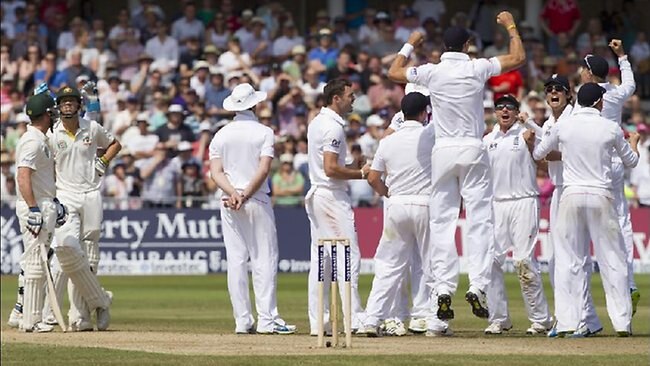Drama brings England review to a thrill in opening Ashes Test
IT was 2005 all over again. Take your pick: either the Edgbaston Test of that series, or Trent Bridge, Old Trafford and The Oval too.
IT was 2005 all over again. Take your pick: either the Edgbaston Test of that series, or Trent Bridge, Old Trafford and The Oval too.
All the tension of that unforgettable summer brought back to life over almost three hours on a final day of a dramatic Test that was decided by the finest of margins.
The conclusion was fitting too, given the drama and controversy that had raged over the rights and wrongs of technology and umpiring decisions throughout the game.
Ten minutes into an afternoon session that had started half an hour late, lunch having been delayed because of prolonged resistance from Australia's last pair, Brad Haddin, playing the innings of his life, drove at an off cutter from James Anderson and stood there, proud and defiant, as England appealed for an inside edge and then reviewed the "not out" call by Aleem Dar.
And so it was down to Marais Erasmus again, the man in the television umpire's chair, and a man who had angered England, in particular, with his decision against Jonathan Trott in the second innings, and his failure to give out Ashton Agar in the first, when he was six runs into a remarkable debut innings of 98. Erasmus asked for Hot Spot, he asked for the audio and then he asked for both again.
Clear in his own mind that he had seen evidence of the edge and had heard a definite noise, he instructed Dar to overturn his decision.
There, and only there, was the difference between that Test at Edgbaston in 2005 and now; whereas England knew back then, pre-DRS, that they had won the match in the instant that Geraint Jones dived to take the edge from Michael Kasprowicz, now they had to wait and wait, agonisingly so, before Anderson led the charge once Dar had changed his decision.
It was unsatisfactory. England did not mind though; soon enough, Anderson's team-mates engulfed him, in joy and gratitude, too, because without Anderson's heroic bowling, England would not have won the match.
Anderson, the man of the match, took five more wickets in the second innings, to add to his five in the first, giving him match figures of ten for 158 in 55.5 back-breaking overs in conditions that were generally inhospitable to fast bowlers. It was a remarkable performance, including as it did small moments of genius, such as his ball to bowl Michael Clarke in the first innings, as well as sustained and accumulated excellence that puts him in the highest rank of England bowlers.
Anderson bowled unchanged for 110 minutes during a hot and humid morning, a 13-over spell that brought him three crucial wickets, those of Agar, Mitchell Starc and Peter Siddle, at the cost of only 29 runs. Cook could not get the ball out of his hand. Even Anderson had to give way eventually, but when Steven Finn, his replacement, leaked 20 runs in two overs, Anderson was led back to the well once more, despite the cramping that was affecting his groin. He has become as important to England as Glenn McGrath was to Australia.
Inevitably, Cook turned to Anderson from the outset of the day. There was no breakthrough with the old ball, though, as Haddin and Agar continued to whittle away at the target. Haddin played a late cut off Anderson for his first boundary of the morning, and swept at Graeme Swann, who continued to bowl indifferently, as if the pressure and expectation upon his shoulders had transmitted reluctant, inhibiting signals to his fingertips.
The new ball was taken; Stuart Broad replaced Swann and scuttled one through Agar's defences, shaving the youngster's off stump. Agar smiled and shook his head. In the absence of swing, Haddin opened his shoulders a little, taking the aerial route and driving Anderson over the top for two fours.
The lead, 137 at the start of play, had been reduced by 33 when Agar edged Anderson, from round the wicket now, to Alastair Cook at slip. It was too much to expect Agar to reprise his role of the first innings, but once again he showed remarkable composure for one so young.
Cook looked like the coolest man on the pitch, snaffling Starc off Anderson two overs later, but even he was not immune to the game's cruel taunts when he put down Peter Siddle, also off Anderson, when the right-hander had made ten. The England captain made up for it, though, taking a brilliant, diving one-handed catch off Siddle, when Australia were still 80 short of the victory target.
The game seemed done.
James Pattinson, though, who had spoken before the game of his desire to avenge what he considered the rough treatment meted out to his brother, Darren, during his one and only appearance for England, set about his task. He played sensibly, he played straight and he played the shot of the morning, when he drove Swann high over long-on for six.
He gave magnificent support to Haddin, who continued to show why he is regarded as among Australia's toughest cricketers and why the selectors had brought him back as vice-captain.
England tightened up: Jonny Bairstow could have run out Haddin, after a mix-up with Pattinson, but his throw was three stumps too wide, then Finn just failed to grasp a difficult chance as Haddin swept Swann in the air to the leg-side boundary.
If Broad's antics on the stroke of lunch, as he bent in slow motion to tie shoelaces that did not need tying, revealed anything, it was that England were keener to get off the field and regroup than Australia. The teams lunched, with one wicket and 20 runs separating them.
During the lunch interval, desperate strains of Jerusalem, Rule Brittania and Land of Hope and Glory were played, and the crowd, silent all morning and engrossed in the cricket, began to rouse themselves thereafter.
They roared their approval when England took the field and when Anderson struck the telling blow, but were alert enough to the cruelty of the moment to applaud Haddin generously as he left the field. He did not deserve to be on the losing side yesterday.
Did England's greater experience count in the end? Did it matter that England's players have known mainly victory against Australia, while Australia's players have mostly known only defeat in Ashes cricket? Perhaps, but the margins were so fine that luck played its part, too.
Certainly, Darren Lehmann, who appeared shortly afterwards to wave to and to thank the Australia supporters, could be mightily proud of his players.
After weeks of shambling ineptness, they had roused themselves to play a full part in a magnificent Test match.
The Times




